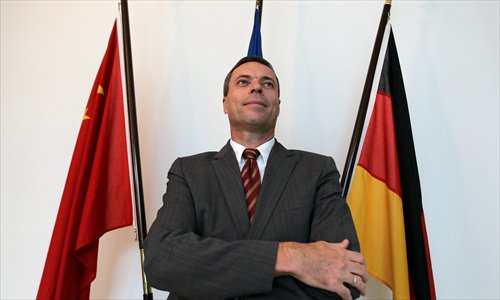Trading more than just goods
German ambassador pushes broader ties with China

Michael Clauss standing outside his office after an interview with the Global Times on Wednesday. Photo: Cui Meng/GT
Against the backdrop of a recent poll conducted by the BBC naming China as the nation most unfavorably viewed by German citizens, Michael Clauss, German ambassador to China, said that people-to-people exchanges remain necessary, and that more channels, including a probable relaxation of visa rules, will be created to help Germany and China to get to know each other better.
"We want more Germans to come to China, to see what the present reality is like. I think today's China is very different from what people believe." Clauss said in an exclusive interview with the Global Times.
Despite the development of an intimate Sino-German economic relationship, misunderstandings about China persist among German citizens. In China too, stereotypes about Germany linger on.
"Sometimes there seems to be not enough knowledge among the German public about China. Many people still imagine China to be as it was 50 years ago, when all people were wearing Mao suits…" Clauss noted.
High-level visits have become a frequent occurrence since Clauss took office as the ambassador in August last year. But he believes that the two countries should create channels for their peoples to communicate, not only government officials.
For that reason, Germany is considering lowering visa requirements as part of a bid to make it easier for Germans to come to China. Meanwhile, the German embassy is also trying to boost student exchanges.
"We have just concluded the Sino-German language year, encouraging Chinese to learn German and Germans to learn Chinese. Obviously learning the other's language is an important aspect of mutual understanding. Now we are about to start the year of student exchange," Clauss added.
The drive to encourage broad-based interaction between China and Germany has fallen on fertile ground. The ambassador expressed his thanks for the strong support the German team enjoyed in China during the recent World Cup.
"We see that Chinese and Germans alike love football. This is we have in common. Football helps to build even more bridges between both nations," Clauss noted.
Relations between Beijing and Berlin have never been stronger than today, said Chinese President Xi Jinping in March during his visit to Germany.
Germany enjoys the smoother relationship with China among major European countries. The basis for this has always been economic exchange, said Clauss.
A series of trade and investment deals in recent years has proven just how effective this cooperation is. Dialogue on political and economic questions was further strengthened by Chancellor Angela Merkel's visit to China this month.
When asked if the chancellor's decision to make her first stop in Sichuan was a sign that German investment in China will move westward, Clauss pointed out that the visit was an appeal to the German business community.
He expects German companies to increasingly invest and become active in China's west, in concert with the Chinese government's Western Development Program.
In response to comments published in the Financial Times saying that most of the common ground that Germany and China share is "economic, not political," Clauss shared his view that momentum in the Sino-German relationship is moving from economics into politics.
"Both of us are becoming more active in global politics and there is a strong interest in working together. We have agreed to enter into a strategic foreign and security policy dialogue. This is without precedence," he said.
In China Germany is often hailed for its deep reflection on wartime history. The ambassador made clear that coming to terms with the past was a painful process in Germany.
"There was a heated discussion in Germany, because many people just wanted to forget. Only after a really long and intense public debate did our new consensus emerge: to avoid history repeating itself by allowing for an open debate on historical guilt."
"In Germany that was our way. We are absolutely convinced that facing up to history was the right thing to do," Clauss said.